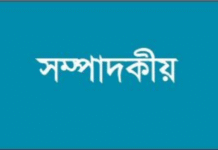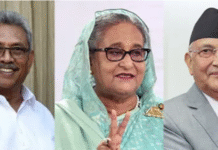MUHAMMAD NURUL HUDA
The controversy over the restoration of non-partisan caretaker government to oversee the general election will continue to haunt the Bangladesh polity every time a government approaches the end of its mandated period. Clearly, the concept of caretaker dispensation is a shameful indictment on the unreliability of the political class. How have we arrived at a situation wherein state institutions cannot be trusted to impartially and honestly conduct an election to the satisfaction of the contending parties?
Constitutionally speaking, after the declaration of election schedule the Election Commission (EC) is in charge of all affairs for conducting the general election. The administration, including the law enforcement organs and the armed forces, are under the command of the EC and all concerned are constitutionally bound to render all assistance to it. Unless the EC does something patently illegal its actions cannot be challenged by any entity or authority.
Why can’t a government and the regulatory institutions of the state be relied upon to honestly and impartially conduct a general election? Have our institutions lost the reliability to faithfully perform their constitutionally charted duties? If so, how and why, and what are the remedies to tide over the recurring uncertainty pertaining to election-time governance?
In most democracies the incumbent government oversees the election after reducing its size to the bare minimum necessary for carrying out routine work. Constitutional bodies, the services and the regulatory institutions do their mandated job for the smooth conduct of the election. Everything runs as usual.
In Bangladesh, however, we cannot put our faith in the normal arrangement. Have those institutions that ensure fair election been adversely incapacitated? If so, how did it happen? Additionally pertinent is the query as to whether the proposed strengthening of the EC would guarantee fair election.
The civil service of the republic owes its loyalty to the government of the day, irrespective of political party, and it is imperative that the service avoids creating the impression of political bias. Civil servants are expected to conduct themselves in such a manner that they deserve and retain the confidence of ministers and be able to establish the same relationship with those whom they may be required to serve in some future administration.
The above is the desirable course but the ground reality is the steady erosion of bureaucratic ethos and politicisation of the service. Professionalism, competence and honesty, the hallmarks of a hallowed system, are allegedly giving way to cronyism and pliability. Favours are allegedly being given to loyal and partisan officials who unlawfully please their superiors. In such a situation, it is becoming increasingly difficult to keep faith in the impartiality and integrity of public servants who are crucial in ensuring fair election.
Insofar as the regulatory agencies are concerned, the allegation is that the interests of the state have often been mixed up with the interests of the party in power. Consequently, all concerned are losing faith in the propriety of the actions of such bodies that play a vital role in the fair and orderly conduction of election.
The need is to ensure that public servants are not preoccupied with inconsequential matters to the detriment of national interests. This is paramount because public leaders are publicly expressing doubts about the neutrality and integrity of vital organs of the state whose functions can neither be arrogated to others nor be privatised. Therefore, the fears about fair election need to be allayed.
If one goes by the history of political transactions in Bangladesh, one would be pragmatic in saying that the incumbent government will not reinstate a system that has only recently been undone and on which the dominant political players of the ruling party hold strong views. One feels that there is an over-arching imperative for breaking the rigidities with a view to achieving socio-political peace and stability, which would demand dexterity and skill on the part of the negotiators.
It is relevant to recollect that any attempt to have political negotiations is constrained by deep suspicions about the good faith of either side, which divides both parties. These suspicions are further compounded by the mutual antipathy of the two principal protagonists who command enormous authority as the leaders of their parties.
The distrust in our polarised society is not limited to the political parties but also extends to even non-party persons who are suspected of partisan leaning. Political utterances of the not-too-distant past reflect the depth of the climate of suspicion.
If we look back, we see that the ground reality compelled the then government in March 1996 to amend the constitution, as the 13th Amendment to the Constitution, to incorporate the provision of a non-party caretaker government. The irony is that the government which seriously questioned the representative status of the caretaker arrangement ultimately agreed to a system of government that was to be made up entirely of members without any representative status. In fact, the 13th Amendment was the recognition of the validity of the demand for elections under a caretaker government.
The ongoing boycott of parliament, compounded by the inability to negotiate a settlement of the caretaker issue, gives rise to apprehension about the sustainability of parliamentary democracy. It is interesting to note here that in mid-1994 the well-intentioned external intervention in Bangladesh’s politics by the Commonwealth Secretariat was felt to have reflected poorly on the state of democratic politics where our parties could not even agree on a non-partisan Bangladeshi personality to mediate a solution to our domestic problems.
A caretaker government is principally a mechanism for extrication from the political quagmire characterised by boycotting of the legislature, proclivity to reckless and vituperative attacks and retorts, and suspected efforts for election engineering by the establishment.
It would appear that the sad and painful episodes of the not-too-distant past are about to revisit us. Coercive show of strength will beget the same in future. In the opposition’s movement to dislodge an elected government, the people will suffer. Industry, trade — national and international — development, banking and finance, and the ordinary people may have to pay a costly price at the altar of power game.
Cynics say that the politicians’ motto appears to be in ‘power at any cost.’ The people do not matter eventually. In such a scenario, the people are the last consideration and hardly ever the first.
While the caretaker arrangement might be construed as a scathing indictment on the unreliability of the political class to fairly conduct national elections, it is also a fact that the determined movement for its restoration is displaying signs of desperation, leading to an ominous future. In a situation where neither the people nor the country might figure as the first priority, our altruistic virtues would be open to question.
The constitution of the republic enshrines fundamental principles of equity and fair play, but in the absence of proactive actions by the principal actors they will remain merely as counsels of moderation. If our society proves to be so perilously polarised that the spirit of moderation is marginally present then nobody can help us. The evasion of responsibility would actually mean the demise of the spirit of moderation. Surely, we do not intend to perish.
The nation urgently requires the exercise of negotiating skill with dexterity and caution. This is not an insurmountable task for our politicians. They may or may not seek the services of persons who are not politically affiliated, but the responsibility of seeking resolution through dialogue and compromise cannot be shrugged off. The imperative is to engage in the arduous process. The demand is for credible elections leading to good government.
Source: The Daily Star









